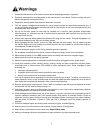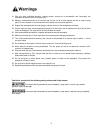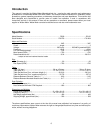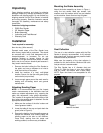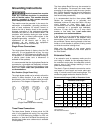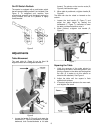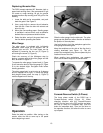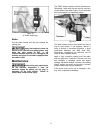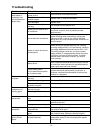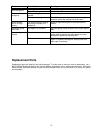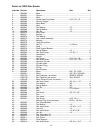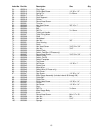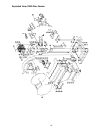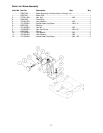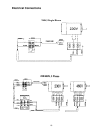
12
Troubleshooting
Trouble Probable Cause Remedy
Machine will not
start/restart or
repeatedly trips
circuit breakers or
blows fuses.
Machine not connected to
power source.
Verify machine is connected to power.
Fuse blown, or circuit
breaker tripped.
Replace fuse, or reset circuit breaker.
Cord damaged. Replace cord.
Extension cord too light or
too long.
Use adequate size extension cord.
Building circuit breaker trips
or fuse blows.
Verify that sander is on a circuit of correct size. If
circuit size is correct, there is probably a loose
electrical lead.
Loose electrical connections.
Go through all the electrical connections on the edge
sander including motor connections, verifying the
tightness of each. Look for any signs of electrical
arcing which is a sure indicator of loose connection or
circuit overload.
Switch or motor failure (how
to distinguish).
If you have access to a voltmeter, you can separate a
switch failure from a motor failure by first, verifying
incoming voltage at 220+/-10% and second, checking
the voltage between switch and motor at 220+/-10%.
If incoming voltage is incorrect, you have a power
supply problem. If voltage between switch and motor
is incorrect, you have a switch problem. If voltage
between switch and motor is correct, you have a
motor problem.
Motor failure.
If electric motor is suspect, you have two options:
Have a qualified electrician test the motor for function
or remove the motor and take it to a qualified electric
motor repair shop and have it tested.
On/Off switch failure.
(or Forward/Reverse switch
on 3 phase model).
If the switch is suspect, you have two options: Have a
qualified electrician test the switch for function, or
purchase a new switch and establish if that was the
problem on changeout.
Disc won’t come up
to speed.
Extension cord too light or
too long.
Use adequate size extension cord.
Low (incoming) voltage. Contact qualified electrician.
Excessive bite, or feed
pressure too great.
Allow sanding disc to cut freely, do not force.
Excessive
replacement of
sanding paper.
Too much pressure being
used during cuts.
Reduce pressure.
Not using full width of belt. Stroke across the belt using full width.
Machine vibrates
excessively.
Sander base not level with
floor.
Shim if necessary.
Not secured to the floor. Use lag screws through holes in base to secure
machine to the floor.
Improper motor mounting. Check and adjust mounting.
Sanding marks on
workpiece.
Sanding paper too coarse for
required finish.
Use proper grit. Coarser grits for stock removal, and
finer grits for finish work.
Workpiece sanded across
grain.
When surface sanding, use fine sanding disc paper
then finish by hand, working in direction of grain.
Sanding grains
quickly rub off
paper.
Sanding paper has lost its
original properties.
Do not store sanding paper in extremely dry or high-
temperature areas. Do not fold sanding disc papers,
store them flat.



